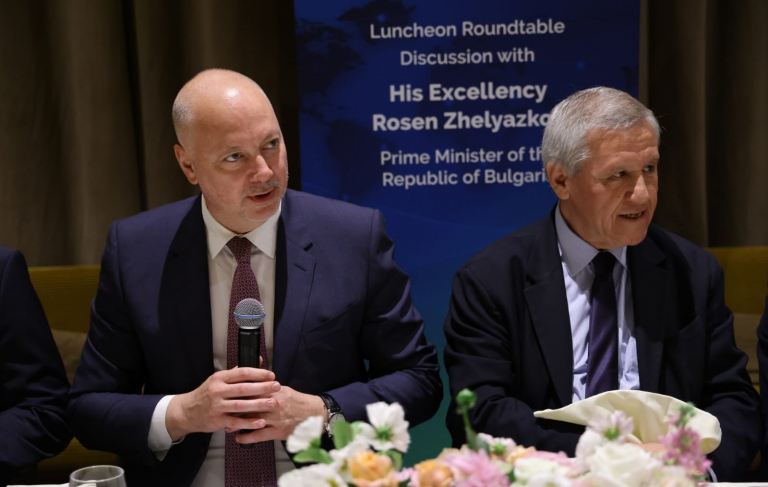
26.09.2025
Bulgaria’s economy is one of the most dynamic and promising economies in Southeast Europe. With its strategic location, competitive conditions for making business and a growing innovation ecosystem, the country provides a stable and predictable environment for companies that seek to establish or expand their business in Europe. This was stated by Prime Minister Rossen Jeliazkov at a working lunch arranged by the Delphi Economic Forum and the BCIU (Business Council for International Understanding), the US organization that promotes dialog between business and political leaders.
Prime Minister Rossen Jeliazkov informed members of the US business community about the advantages of Bulgaria as an investment destination. In addition to its membership in the EU and NATO, the Prime Minister noted the country’s accession to the Schengen area and the Eurozone as a guarantee of stability and predictability. Located at the crossroads of Europe, Asia and the Middle East, Bulgaria offers access to over 500 million customers in the EU and 1.3 billion customers in regions in the direct vicinity. With five pan-European transport corridors, four international airports, Black Sea ports and terminals on the River Danube, the country offers fast and efficient connectivity for trade, supply chains and digital infrastructure, Rossen Jeliazkov said further.
Prime Minister Rossen Jeliazkov described Bulgaria’s taxation system as one of the most attractive systems in Europe – with a 10% flat corporate tax and a 10% flat personal income tax. The Prime Minister stressed the development of a national network of industrial zones. As he said, key sectors with strong investment potential are car manufacturing and electric-powered vehicles, electronics, mechantronics engineering, pharmaceuticals, renewable energy, information and communication technologies (ICTs) and smart production.
Prime Minister Rossen Jeliazkov emphasized the cabinet’s commitment to improve Bulgaria’s innovation performance and to increase the potential of the knowledge-based economy by prioritizing smart production, digitalization and research and development in high-tech sectors.
The Prime Minister specially gave prominence to the country’s innovation potential with the Institute for Computer Science, Artificial Intelligence and Technology (INSAIT), established owing to the key role of two of the world’s leading universities – the Federal Institute of Technology Zurich/Eidgenössische Technische Hochschule Zürich/ETH Zürich; and the Federal Institute of Technology Lausanne/École Polytechnique Fédérale de Lausanne/EPFL and the University of Sofia, and in partnership with world leaders such as Google, Amazon Web Services and DeepMind. In addition, Prime Minister Rossen Jeliazkov stressed the Discoverer supercomputer installed in Sofia Tech Park and ranked among the most efficiently operating computing systems in Central and Eastern Europe. Also, Bulgaria supports the development of a national Artificial Intelligence infrastructure, including its own large language model (BgGPT) and the upcoming AI factory BRAIN++. Both are part of a broader government strategy to enhance digital sovereignty and promote next-generation innovation.